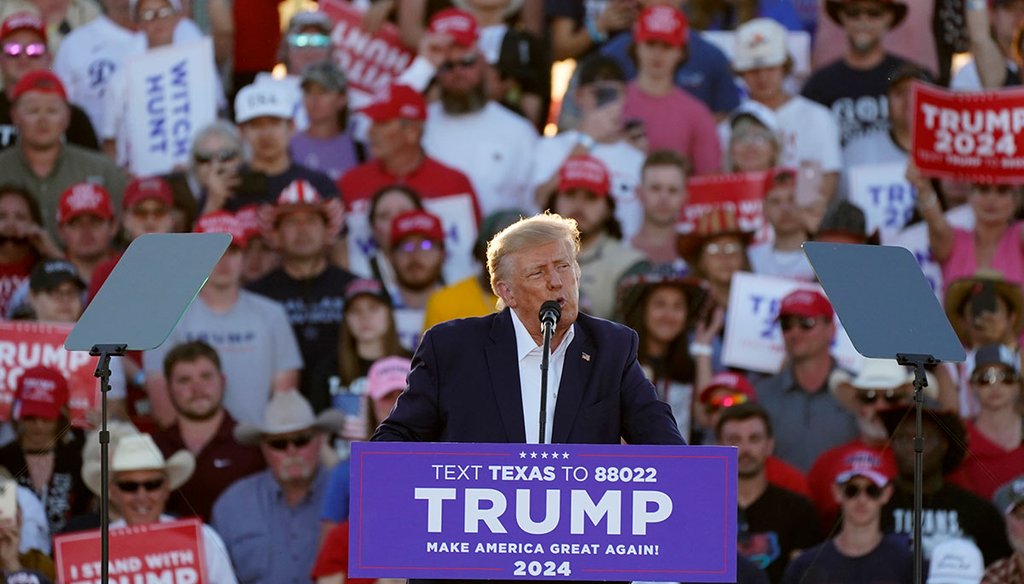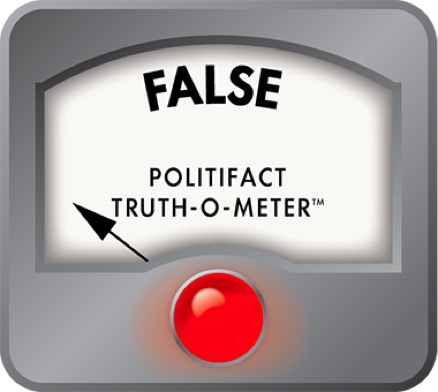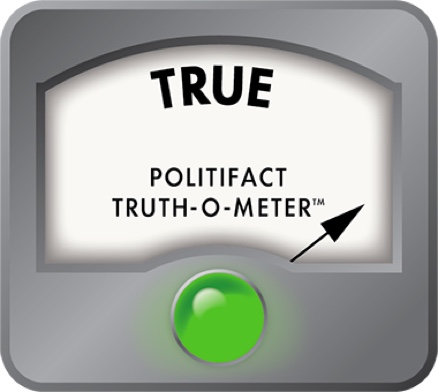Stand up for the facts!
Our only agenda is to publish the truth so you can be an informed participant in democracy.
We need your help.
I would like to contribute

Former President Donald Trump speaks March 25, 2023, at a rally in Waco, Texas. (AP)
After weeks of speculation, former President Donald Trump was indicted — but our fact-checking of the case and related misinformation began long before the indictment.
The unprecedented development involves a $130,000 hush money payment in 2016 to adult film actor Stormy Daniels. Trump’s former lawyer, Michael Cohen, pleaded guilty in 2018 for his role in facilitating the payments, which were made days before the presidential election. In May 2018, Trump confirmed in a series of tweets that he had personally reimbursed Cohen for the payments.
A Manhattan grand jury voted March 30 to indict Trump. District Attorney Alvin Bragg brought the charges against the 45th president.
On April 4, Trump appeared in a New York courtroom and pleaded not guilty to 34 felony criminal charges of falsifying business records.
But how did we get here? Here’s our updated timeline on what Trump and his advisers have said about the case. And below are recent stories and fact-checks about the case.
Have a post or claim about this that you want us to fact-check? Send it to [email protected].
-
Read the 34 felony charges in the Donald Trump indictment over the Stormy Daniels payoff
-
Trump’s indictment, explained: Falsifying business records, prosecutors’ challenges, and what’s next
On April 4, Trump pleaded not guilty to 34 felony counts of falsifying business records in the first degree during a non-televised court appearance in Manhattan. The charges stem from the payment to Daniels, as well as attempts to buy the silence of two other people.
Bragg said Trump improperly funded the payoff as a business expense and called it evidence of a broader practice of "catch and kill," in which people were paid to silence their stories about Trump.
The crime of falsifying business records is a misdemeanor in New York’s penal code, but it becomes a felony if the person falsified the records with an intent to commit another crime, or to aid or conceal the commission of a crime.
Hours after appearing in a Manhattan courtroom for his arraignment, Trump returned home to Mar-a-Lago, his estate in Palm Beach, Florida, and gave a speech.
He largely avoided discussing specifics of the case and instead defended himself in other investigations, including one looking into classified documents found at Mar-a-Lago. We fact-checked a few of Trump’s statements that were false, misleading or lacked context.
Some Republican leaders decried Trump’s indictment as indicative of an unstable government.
The claim that governmental leaders facing criminal charges are more common in other countries is accurate — it’s unprecedented in U.S. history. But these incidents aren’t exclusive to underdeveloped nations.
We examined what the modern process of bringing criminal offenses against one’s leaders has looked like elsewhere, including in Israel, Italy and France.
An indictment is one way to bring charges against someone suspected of a crime. Charges can be brought forward in criminal cases in one of three ways: through an indictment by a grand jury, a filing directly by a prosecutor or a police officer can make a probable cause arrest, said Kendall Coffey, a former U.S Attorney in Miami now in private practice.
An indictment is a statement of charges and it alone does not mean a defendant is guilty. In New York state, people cannot be brought to trial for a felony unless they have been indicted by a grand jury. Before Trump, no American president has been indicted on criminal charges either while in office or after leaving the White House.
Because criminal charges against a former president are unprecedented, many wonder whether Trump could still run for a second presidential term.
Experts agreed that criminal charges wouldn’t prevent Trump from running, and while it may create some logistical hurdles, it likely wouldn’t pose legal issues for his campaign.
"There is no bar to running for president while under indictment and nothing that would prevent his serving as president," said Stanley Brand, a longtime election law expert and now a distinguished fellow in law and government at Penn State Dickinson Law.
The U.S. Constitution upholds the principle that voters decide who shall represent them, and its qualifications are limited to natural-born citizenship, age (35 by Inauguration Day) and residency in the United States (for 14 years).
A candidate who is incarcerated would not be able to appear in person on the campaign trail. But experts said that at least in the case relating to Daniels’ payments, the chance of incarceration before trial, even temporarily, is effectively zero.
In a Feb. 20 post on his Truth Social platform, Trump wrote that the Federal Election Commission dropped an inquiry into complaints against Cohen, Trump and Trump’s campaign for possible campaign finance violations because they "found no evidence of problems." Trump added that "the statute of limitations also stops them cold from going forward."
But a closer look at these arguments showed Trump’s assertions were misleading.
His characterization of the commission’s actions is wrong, and the statute of limitations in one of the possible charges may not apply because Trump changed his residence from New York to Florida in 2019.
Once Trump supporters learned an indictment could be forthcoming, many took to social media to draw comparisons with a scandal involving former President Bill Clinton.
The posts decried a double standard and claimed Clinton got off lightly after he paid $850,000 to Paula Jones following her accusations of sexual impropriety in the early 1990s. Jones was an Arkansas state employee when Clinton was Arkansas’ governor.
But legal experts said Trump’s payment to Daniels and Clinton’s settlement with Jones are markedly different. Clinton personally paid Jones to settle a public lawsuit after an election. Trump used his personal lawyer, Cohen, to secretly pay Daniels to stay quiet before the 2016 presidential election. In August 2018, Cohen pleaded guilty to campaign finance violations and other crimes tied to his role in arranging the payments to Daniels and another woman.
Since news about the indictment first surfaced, Trump has focused on portraying Bragg as being driven by partisan intent. Trump claimed that liberal billionaire George Soros donated $1 million to the Color of Change PAC, which has a record of backing candidates who support criminal justice reform, and had endorsed Bragg for the Manhattan district attorney job.
Soros did donate to the PAC in May 2021, just before it publicly backed Bragg, but that money wasn’t earmarked for Bragg. Color of Change was supporting other progressive district attorney candidates that year in different cities, and had done so in previous election cycles as well.
While awaiting the New York indictment, Trump criticized Bragg, the Manhattan district attorney, and wrote on Truth Social that Bragg didn’t care about crime in Manhattan, which Trump claimed is "now at a RECORD LEVEL."
Our review of the New York City Police Department's Manhattan crime data found that major felony offenses in 2022 are far from a "record level." There were about 34,000 reported felonies boroughwide in 2022. That figure was almost 150,000 in 1990, nearly five times higher than today’s level.
A guest on a Feb. 15 CNN show said he thought former President Donald Trump would be indicted. The network itself did not report or "confirm" that Trump would be arrested, as a viral social media post alleged.
On March 18, the day Trump announced he believed he would be arrested, photos purporting to show his arrest and his mugshot circulated online. The images were fabricated, with giveaways such as different clothing on Trump in different images.
As Trump was sharing posts about what he believed would be his impending arrest, internet users circulated a statement attributed to him threatening Republican House Speaker Kevin McCarthy. The statement attributed to Trump’ said McCarthy should "end the investigations" or Trump would leak videos of McCarthy and direct supporters in Congress to end his speakership.
But the statement wasn’t authentic, and it was first shared March 18, 2022, nearly a year before McCarthy was elected speaker in January 2023.
Old footage of Trump supporters was repackaged on social media, where claims said it showed people in 2023 protesting his possible arrest. The footage, however, was from Oct. 4, 2020, when Trump supporters blocked Fifth Avenue in New York after he was diagnosed with COVID-19.
As Trump railed against the investigation on Truth Social, one post circulated that claimed he wrote, "Remember, any indictment of ME is an indictment of YOU…" We found no evidence that Trump ever posted it, and the image includes a meme website watermark.
A Facebook post claimed that Trump shared a "bombshell" letter from Stormy Daniels debunking the case. But the letter wasn't new information. Daniels released it in 2018 and, shortly after, recanted what she said in it. The Manhattan district attorney built its case with full knowledge of its existence.
Our Sources
PolitiFact, Timeline: What Donald Trump has said about Stormy Daniels and $130,000 payment, March 21, 2023
Justice.gov, Michael Cohen Pleads Guilty In Manhattan Federal Court To Eight Counts, Including Criminal Tax Evasion And Campaign Finance Violations, Aug. 21, 2018
CNN, March 30, 2023 Trump indictment news, March 30, 2023
PolitiFact, Trump’s attacks on Manhattan DA Alvin Bragg’s backing by George Soros: What to know, March 23, 2023
PolitiFact, Q&A: Can Trump run for president if indicted in Stormy Daniels case? What happens if he's arrested?, March 20, 2023
PolitiFact, Fact-checking Trump on the Stormy Daniels case: The statute of limitations and the FEC's role, March 21, 2023
PolitiFact, How Bill Clinton’s settlement with Paula Jones differs from Donald Trump’s Stormy Daniels payment, March 21, 2023
PolitiFact, Trump’s attacks on Manhattan DA Alvin Bragg’s backing by George Soros: What to know, March 23, 2023
PolitiFact, Donald Trump exaggerates Manhattan crime levels in attacks on DA in Stormy Daniels case, March 24, 2023
PolitiFact, No, CNN didn’t confirm Trump will be arrested, Feb. 17, 2022
PolitiFact, These are not real photos of a Donald Trump arrest, March 20, 2022
PolitiFact, Fake statement attributed to Donald Trump about Kevin McCarthy emerges amid flurry of arrest posts, March 21, 2023
PolitiFact, Video shows "Trump supporters lining up on Fifth Ave in Manhattan on Sunday.", March 21, 2023
PolitiFact, Former President Donald Trump’s Truth Social posts about his possible arrest don’t include this one, March 21, 2023
PolitiFact, What is an indictment and what does it mean for Donald Trump?, March 31, 2023
























